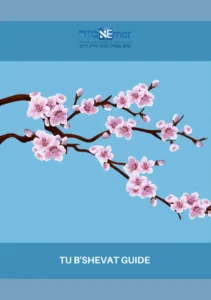
A Guide to the Laws and Customs of
Tu B’Shvat
Halakhic Significance of Tu B’Shvat
Tu B’Shvat, the 15th of Shvat on the Jewish calendar (Thursday, February 13th, 2025), is referred to by the Sages as the “New Year of the Trees.” Halakhically, Tu B’Shvat marks the beginning of the agricultural year for trees concerning many mitzvot.
Tu B’Shvat has significant halakhic ramifications for agricultural mitzvot, primarily in the following areas:
Seven-Year Agricultural Cycle of Tithes in the Land of Israel
- Tu B’Shvat serves as the dividing line for determining the agricultural year for trees (but not for vegetables).
- Fruit that blooms before Tu B’Shvat 5785 is classified as second-year fruit, meaning it belongs to the second year of the agricultural cycle. It is subject to second-year tithes (teruma, ma’aser rishon, and ma’aser sheni).
- Fruit that blooms after Tu B’Shvat 5785 is classified as third-year fruit, making it subject to third-year tithes (teruma, ma’aser rishon, and ma’aser ani).
- Tithes must be taken from fruit that bloomed in the same agricultural year. Therefore, fruit that bloomed before Tu B’Shvat may not be used for tithing fruit that bloomed afterward, and vice-versa.
Prohibition of Orla
- Tu B’Shvat marks the conclusion of the three-year prohibition for fruit grown on newly planted trees, known as orla, in most cases.
- Fruit that blooms before Tu B’Shvat in the tree’s third year is classified as third-year fruit and remains forbidden.
- Fruit that blooms after Tu B’Shvat in the third year is classified as fourth-year fruit (neta revai), which must be redeemed before consumption (see here ⇒ for more details).
Tu B’Shvat’s halakhic significance is mostly agricultural and applies primarily in Israel, as well as when one purchases Israeli produce outside of Israel. However, one halakhic aspect – fasting – is relevant everywhere (as discussed below). Other customs are also observed in the Diaspora.
Fasting on Tu B’Shvat
- One may not fast on Tu B’Shvat, nor should a community fast be declared on this day.
Tefilla (Prayer) Guidelines
The regular weekday prayer service is recited on Tu B’Shvat, with the following two exceptions.
- Tachanun
- Due to the somewhat festive nature of Tu B’Shvat, Tachanun (supplications recited immediately after the Shemoneh Esrei) is omitted during Shacharit (morning prayer) and Mincha (afternoon prayer).
- Many also omit Tachanun at Mincha on the preceding day, similar to the day before other Jewish holidays.
- Lamnatze’ach
- Sephardim typically do not recite Lamnatze’ach (Psalm 20, recited towards the end of the Shacharit service), which asks Hashem to answer us on days of distress.
- Ashkenazim, on the other hand, recite Lamnatze’ach on Tu B’Shvat and other minor holidays.
Festive Clothing
- Some have a custom to wear Shabbat clothing on Tu B’Shvat in honor of the day.
Eating Fruits
Some people customarily eat additional fruits on Tu B’Shvat, especially those grown in the Land of Israel.
Reciting the Blessing on Fruit
- Before eating fruit, one recites the berakha (blessing) of borei pri ha’etz:
בָּרוּךְ אַתָּה אֲ- דֹנָי אֱ- לֹהֵינוּ מֶלֶךְ הָעוֹלָם בּוֹרֵא פְּרִי הָעֵץ
Barukh ata A- donai E- loheinu Melekh ha’olam borei pri ha’etz.
Blessed are You, God, our Lord, King of the world, who creates the fruit of the tree.
Shehechiyanu
- If a particular type of fruit is being eaten for the first time during the current winter season, one recites the blessing of Shehechiyanu before eating it.
בָּרוּךְ אַתָּה אֲ- דֹנָי, אֱ- לֹהֵינוּ מֶלֶךְ הָעוֹלָם, שֶׁהֶחֱיָנוּ וְקִיְּמָנוּ וְהִגִּיעָנוּ לַזְּמַן הַזֶּה
Barukh ata A- donai E- loheinu Melekh ha’olam shehechiyanu vekiyemanu vehigiyanu lazeman ha’zeh.
Blessed are You, God, our Lord, King of the world, who has kept us alive, sustained us, and brought us to this season.
[Translation adapted from blog.artscroll.com]
- Sephardim typically recite Shehechiyanu before the blessing of borei pri ha’etz.
- Ashkenazim typically recite Shehechiyanu after the blessing of borei pri ha’etz, but before taking a bite of the fruit.
- If one is eating multiple new fruits, Shehechiyanu need only be recited once.
Berakha Acharona on Fruit
- One who eats at least a kezayit (an olive portion, approximately 27 grams) of fruit of the seven species should recite the berakha acharona (after-blessing) of “Al ha’aretz ve’al ha’peirot.” If one also ate food prepared from the five grains, one should add the text in brackets.
בָּרוּךְ אַתָּה אֲ- דֹנָי אֱ‑ לֹהֵינוּ מֶלֶךְ הָעוֹלָם, [עַל הַמִחְיָה וְעַל הַכַּלְכָּלָה וְ] עַל הָעֵץ וְעַל פְּרִי הָעֵץ וְעַל תְּנוּבַת הַשָּׂדֶה וְעַל אֶרֶץ חֶמְדָּה טוֹבָה וּרְחָבָה שֶׁרָצִיתָ וְהִנְחַלְתָּ לַאֲבוֹתֵינוּ לֶאֱכוֹל מִפִּרְיָהּ וְלִשְׂבּוֹעַ מִטּוּבָהּ. רַחֵם (נָא) אֲדֹ- נָי אֱ- לֹהֵינוּ עַל יִשְׂרָאֵל עַמֶּךָ וְעַל יְרוּשָׁלַיִם עִירֶךָ וְעַל צִיּוֹן מִשְׁכַּן כְּבוֹדֶךָ, וְעַל מִזְבְּחֶךָ, וְעַל הֵיכָלֶךָ. וּבְנֵה יְרוּשָׁלַיִם עִיר הַקּדֶשׁ בִּמְהֵרָה בְיָמֵינוּ. וְהַעֲלֵנוּ לְתוֹכָהּ וְשַׂמְּחֵנוּ בְּבִנְיָנָהּ, וְנֹאכַל מִפִּרְיָּהּ וְנִשְׂבַּע מִטּוּבָהּ וּנְבָרֶכְךָ עָלֶיהָ בִּקְדֻשָּׁה וּבְטָהֳרָה, כִּי אַתָּה אֲדֹ- נָי טוֹב וּמֵטִיב לַכֹּל וְנוֹדֶה לְךָ עַל הָאָרֶץ [וְעַל הַמִחְיָה] וְעַל הַפֵּרוֹת
בָּרוּךְ אַתָּה אֲ- דֹנָי, עַל הָאָרֶץ [וְעַל הַמִחְיָה] וְעַל
על שבעת המינים: הַפֵּרוֹת
על שבעת המינים של ארץ ישראל: פֵּרוֹתֶיה
Barukh Ata A- donai E- loheinu Melech ha’olam, [al ha’michya ve’al ha’kalkala ve’] al ha’etz ve’al pri ha’etz, ve’al tenuvat ha’sadeh, ve’al eretz chemda tova urechava, sheratzita vehinchalta la’avoteinu, le’ekhol mipirya velisbo’a mituva. Rachem na A- donai E- loheinu al Yisrael amekha, ve’al Yerushalayim irekha, ve’al Tzion mishkan kevodekha, ve’al mizbechekha, ve’al heikhalekha. Uvneh Yerushalayim ir ha’kodesh bimhera beyameinu, veha’aleinu letokha vesamcheinu bevinyana. Venokhal mipirya venisba mituva, unevarekhekha aleha bikedusha uvetahara. Ki Ata A- donai tov umeitiv lakol venodeh lekha, al ha’aretz [ve’al ha’michya] ve’al ha’peirot.
Barukh Ata A- donai, al ha’aretz [ve’al ha’michya] ve’al ha’peirot [for fruits grown in Israel, replace “ve’al ha’peirot” with: ve’al peiroteha].
Blessed are You, God, our God, King of the world, [for the sustenance and for the nourishment and] for the tree and for the fruit of the tree, for the produce of the field, and for the desirable, good, and spacious land which You desired and gave as an inheritance to our forefathers, to eat of its fruit and to be satiated with its goodness. Have mercy, Lord our God, on Israel Your people, on Jerusalem Your city, on Zion the dwelling place of Your glory, on Your altar, and on Your Temple. Rebuild Jerusalem, the holy city, speedily in our days. Bring us up into it, and gladden us with its rebuilding. May we eat of its fruit and be satiated with its goodness and bless You upon it in holiness and purity. For You are good and do good to all, and we thank You for the land [and for the sustenance] and for the fruits.
Blessed are You, God, for the land [and for the sustenance] and for the fruits [for fruits grown in Israel, replace “for the fruits” with: for its fruits].
Avoiding the Consumption of Insects
- Some fruits may contain insects, which are forbidden to consume. Proper checking procedures should be followed prior to eating them to avoid any inadvertent transgression.
The Etrog and Tu B’Shvat
- Some have a custom on Tu B’Shvat of praying for a beautiful etrog to use for the following Sukkot, since this is when the etrog begins to bloom. The prayer for this custom can be found here ⇒
- Some have a custom of eating etrog jam on Tu B’Shvat.
Recommended Resources for Further Reading
- GENERAL RESOURCES ON TU B’SHVAT:
- SEDER:
- AGRICULTURAL MITZVOT:
- Torah VeHa’aretz Institute (Tithes and Orla)
- Halachipedia (Tithes)
- Torah VeHa’aretz Institute (Orla)
- INSECTS:
- ORDER OF BERAKHOT AND SHEHCHIYANU:
- OU Kosher (When to say Shehechiyanu)
- Halacha Yomit (Order of berakhot for Sephardim)
- OU Kosher (Order of berakhot)
- Matan (Order of berakhot)
- Halachically Speaking (The berakha of Shehechiyanu on fruits)
- MATERIAL FOR CHILDREN:
- Torah VeHa’aretz Institute (Coloring pages)
- Lookstein (Tu B’Shvat seder for young children)
- Lookstein (Tu B’Shvat collection of resources)

